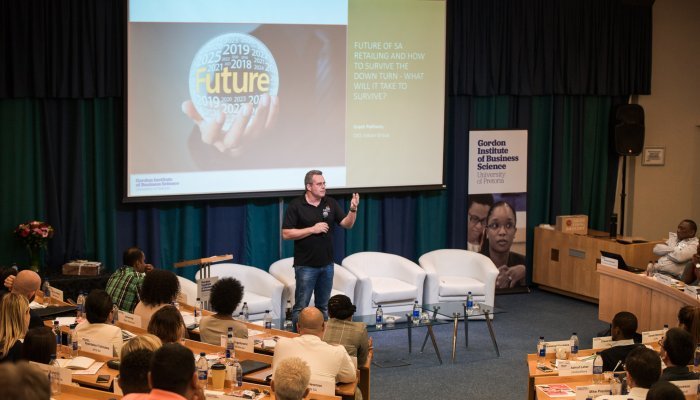Grant Pattison officially took the helm at the embattled Edcon Holdings group in 2018 after seven years as CEO of Massmart. Best known for brokering the sale of a majority share in the company to the USA giant, Walmart. Pattison spoke at the GIBS 2018 Retail and Consumer Insights conference in March, sharing his thoughts on the future of retail, the plan to fix Edcon and lessons he’s learned over his years in retail.
Is retail really changing?
Pattison freely admits that he is a cynic when it comes to changes facing retail (and most other things, apparently, including IT salespeople and business books).
“Do you think if you went back to Jerusalem or Cairo or Rome in the ancient world that retail was any different then?” he asked. “If you spoke to a retailer, they’d probably tell you they were impacted by political change (this Jesus guy), the Romans and their impact on the supply chain, the frustrations of getting stock, the way the world was changing and how fast technology was changing.”
Retail, he posits, is not changing. It remains the same. What is changing, however, is people. “People are fundamentally changing the way they think and behave,” Pattison says. “Customers are different. We have changed. My advice to you would be to be cautious of the sales pitch about ‘the world is changing and if you don’t change you’re going to go out of business’,” he says. “Rather spend time understanding generational change. Watch the mega trend of how the human condition is changing. Study the new generation and keep in touch with what’s happening. And hire some young people so they can tell you how it all works.”
Survival strategies
In terms of surviving downturns in the economy, Pattison notes that it’s important to look through the cycle. “It’s like any form of investing,” he says. “It’s a difficult game and the people who really succeed at it just tend to ignore the cycle. If you respond to the cycle too much, your human emotions will work against you. Panic will cause you to do the wrong things; hope even more so. The real thing that you need to survive is discipline.”
This, of course, includes financial discipline. First off, Pattison’s advice is not to use EBITDA as a primary measurement tool. “EBITDA assumes that the capital is free from two perspectives – that you don’t have to pay interest on it and you don’t have to depreciate it. Managing your business by EBITDA will ultimately ignore your most important discipline, which is return on capital.”
He says that after one has been in business for some time, looking back it becomes easy to see that the majority of mistakes one makes relate to investing money, depleting cash and then not getting a return on that outlay.
Discipline, Pattison says, is also about constantly measuring performance against the goals originally set out. “Over time, managing the income statement is relatively easy. What takes discipline is working out whether you’ve made a return on capital.”
Cursed consultants
Another Pattison pearl of wisdom is, “Don’t use consultants (to do your job).” Consultants are useful for helping with short-term skills and requirements, but Pattison cautions against using a management consultant. “Aren’t you the manager?” he asks, wryly. “If you find Bain or McKinsey in your business, you must know you’re in trouble.”
It’s clear that the foreign currency debt incurred by Bain before the consultancy walked away from Edcon still smarts.
In tough times, Pattison says, it’s also wise to try to unlearn all the lessons learnt in the good times. “I got very lucky in retail. I got asked to take over Game in 2001. I was 29 years old. I knew nothing about nothing. What happened was that the consumer economy went on a record run from 2000 to 2008. Anything you did worked – absolutely anything. The people who learnt everything in those times… we think we’re geniuses. I can see this problem at Edcon, which was the most successful retailer in South Africa between 2000 and 2008. It’s hard – we are ego-driven creatures. When you’ve done something, and it worked, it’s incredibly hard to actually learn the right lesson. Instead of thinking, ‘Well I increased the SKU densities in the high-tech area (which I did in Game) and that was the reason it performed’, you need to know that the real reason was that some person invented the flat television screen and everyone changed from a curved TV to a flat TV. It’s hard to unlearn it – I have it built into my brain that the way you fix a business is to increase the SKU density. You’ve got to be conscious of those things.”
“Retail, he posits, is not changing”
He says that bad times are actually the best time to learn proper lessons. “This is the time when great retailers are made.”
Another important strategy is to break one’s business up into business units, and to understand each one. “There are no general solutions to general problems,” says Pattison. “There are only specific solutions for specific problems. Decentralised decision-making is a discipline.”
Fire them
Pattison’s most provocative piece of business advice is to “fire the underperformers and assholes”. He notes that firing the former is easier than the latter, but that it’s worth getting rid of people who do not align with the company’s culture. “I recognise that someone who’s an asshole in one company is not necessarily one in another company, so let them go and find the right company,” he says.
He also advises against trying to be clairvoyant. “If you think you can predict how things are going to turn out, you’re just being arrogant,” he says. “Rather remain connected to your customer and the changes and trends and respond faster than your competitor.”
He notes that it’s difficult to remain connected to the customer. Edcon has 45 000 staff and serves 12 million customers a month. “That might surprise you, if you think our stores always look empty,” he quips. “When it gets big, it’s hard to stay connected, especially because I’m not the customer – some rich, white, male CEO. I’m in the minority of evil. What do I know about the average person in the world? What I suggest you do, is to look at the research data. Find it; read it. More importantly, be accessible to customers.”
Pattison has made it known throughout the Edcon group that anyone who asks for his personal telephone number should be given it. “I always phone the customer back because the stuff you learn in that conversation is remarkable. It’s not a waste of time.”
He advocates allowing employees to fix their own problems, and to never punish them for it. It’s important to understand that staff are connected to the customer. “Your staff know what’s wrong with your business,” Pattison says. “Find them, ask them. Give them access to you. And let bad news flow upwards. It’s hard, but you cannot beat people up for giving you bad news. But that information will allow you to stay connected to your customer. The rule I’m trying to implement at Edcon is that if you make a mistake, but you tell your boss or me, you get off free.”
Mapping the future of Edcon
“Edcon is a real-life business case on the subject of the future of retail and how to survive the downturn,” says Pattison. “Edcon has been in an 11-year downturn – even when the economy was in an upturn.”
He says there have been four key mistakes made at Edcon:
1. Leverage – in 2006, Bain Capital bought Edcon for roughly R25 billion and then raised bonds of about R24 billion in foreign currency. “You can’t gear a credit fashion vertically integrated company,” says Pattison. “In fact, I think you need quite a lot of equity funding or working capital (both in the book and in the creditors) to survive. That’s what you’ll see in Truworths or Foschini.”
2. Selling the credit book – in 2012, Edcon sold its credit book to Absa for R10 billion.
3. Launching international brands – Edcon signed up 30 international brands in a year and pushed them into stores, removing its own well-established brands from the front of stores. “It just absolutely destroyed the business,” says Pattison. “An international brand product is on average 10 times more expensive than the local brand product and its margin is half.”
4. Opening too many stores.
Pattison says the company is encouragingly actually well run at its deeper levels but has suffered because of poor leadership. “The board, the owners and the CEO have just been idiots for the last 10 years,” he says. “This company has been completely destroyed – it is such a crime. As a South African, I am quite angry about it, which is one of the reasons I’m here.”
...the company is encouragingly actually well run at its deeper levels...
He says fixing the company requires undoing the mistakes that have been made. “How do we get out of leverage? Debt-to-equity – it’s the only thing we can do. By the end of this restructuring, there will be no debt left. How do we fix the credit book sale? What we’ve done is we’ve started what we call the second-look book. If Absa says no, we go and grant credit. It allows us, as the Absa book shrinks, to add to our own book. In five years’ time, we’ll take back the book and come up with a financing arrangement. What we won’t do is push the credit. We’re happy to keep the credit/cash sales mix the same, but now we are back in control of our business. For the last five years, we haven’t been.”
The international brands have been taken out of stores. It cost R1.5 billion to bring them in and Pattison reveals it cost the same amount to undo that mistake. “We wasted R3 billion,” he says. Importantly, the company has also had to reinvest in its own local brands.
The company will also close some of its stores, although the exact strategy around this is still being worked out.
“That’s it – it’s no more sophisticated than that,” says Pattison. “It would have been a different story if, when I’d dug deeper, I had found more rot. But what I really have to do is let this group of people, who, by the way, knew every one of these decisions was wrong… I have to let them do what they’re good at.”
He admits that he knows nothing about fashion, and says his job is merely to help with the “corporating” – things like introducing structure and process, and putting decent measurement, management accounting and incentive systems in place. “I’m leaving the fashion retail alone. We’ll see whether it all works!”
















